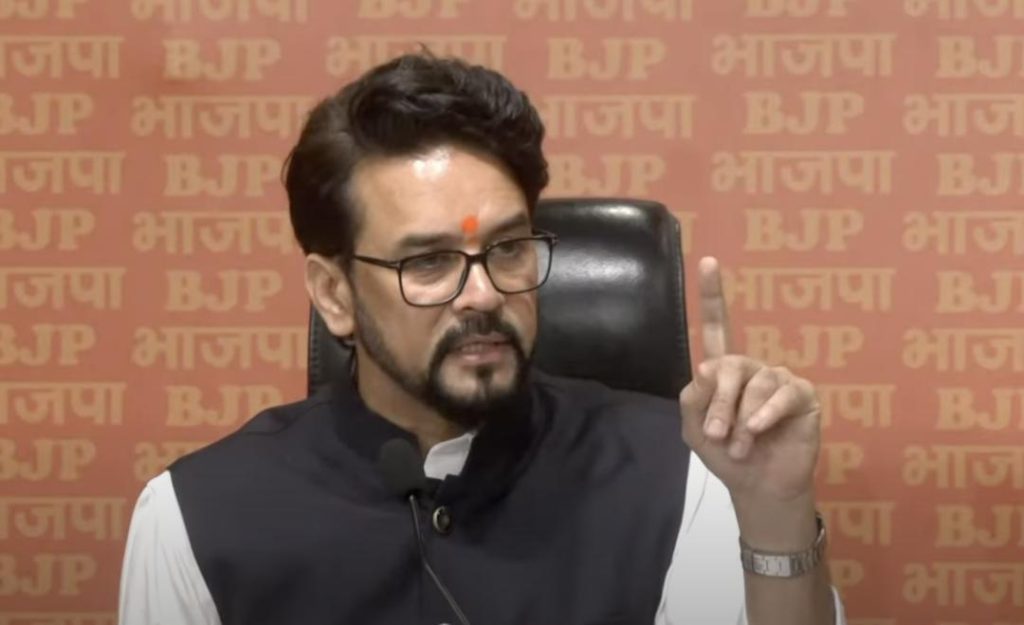
Congress & CPI made Bhimrao Ambedkar lose the poll in 1952: BJP
The Indian general election of 1952 was a landmark event in the country’s electoral history. It was the first general election after India gained independence from British colonial rule and saw the rise of various political parties vying for power. However, according to BJP MP Anurag Thakur, a shocking incident occurred during this election that had far-reaching implications for Indian politics. In a recent statement, Thakur claimed that the Congress and Communist Party of India (CPI) joined forces to defeat Dr. Bhimrao Ambedkar, the chief architect of India’s Constitution, in the 1952 general election.
Dr. Ambedkar, a renowned social reformer and Dalit leader, was a prominent figure in Indian politics during the 1940s and 1950s. He played a crucial role in the drafting of India’s Constitution and was the first Law Minister of India. Despite his significant contributions to the country’s independence and development, Ambedkar’s electoral journey was marked by several defeats. However, his loss in the 1952 general election, as claimed by Thakur, was a significant setback that had long-term consequences for Indian politics.
According to Thakur, 74,333 votes were rejected in the 1952 election, which had a significant impact on the outcome of the polls. He alleged that the Congress and CPI conspired to defeat Ambedkar, a “constitution maker and saint-like leader,” to eliminate a powerful voice for the Dalit community. Thakur’s statement has sparked a renewed interest in Ambedkar’s electoral history and the role played by the Congress and CPI in his defeat.
Ambedkar’s political career was marked by several electoral defeats, which were often attributed to the complex web of caste and community dynamics in Indian politics. However, his loss in the 1952 general election was particularly significant, as it came at a time when he was at the peak of his political influence. Ambedkar was the Chairman of the Drafting Committee of the Constitution and had played a key role in shaping India’s post-colonial political landscape.
The 1952 general election was a significant event in Indian politics, as it marked the first general election after India gained independence. The election was contested by various political parties, including the Indian National Congress, Communist Party of India, and other regional parties. The election saw a high voter turnout, with over 45 crore voters exercising their franchise.
Despite Ambedkar’s significant contributions to Indian politics, his electoral journey was marked by several setbacks. He contested the 1952 general election from the Bombay South constituency, but lost to the Congress candidate, Yashwantrao Chavan. Ambedkar’s defeat was attributed to various factors, including the influence of caste and community dynamics in the constituency.
Thakur’s statement has sparked a renewed interest in Ambedkar’s electoral history and the role played by the Congress and CPI in his defeat. While Ambedkar’s loss in the 1952 general election was attributed to various factors, Thakur’s claim that the Congress and CPI conspired to defeat him has raised questions about the integrity of the electoral process during that time.
The Indian electoral process has undergone significant changes since the 1952 general election. The introduction of the First Past the Post (FPTP) system and the use of electronic voting machines (EVMs) have improved the efficiency and transparency of the electoral process. However, allegations of electoral corruption and manipulation continue to plague the Indian electoral system.
In conclusion, the 1952 general election was a significant event in Indian politics, marked by the defeat of Dr. Bhimrao Ambedkar, the chief architect of India’s Constitution. According to BJP MP Anurag Thakur, the Congress and CPI conspired to defeat Ambedkar, a “constitution maker and saint-like leader,” to eliminate a powerful voice for the Dalit community. While Ambedkar’s loss in the election was attributed to various factors, Thakur’s claim has raised questions about the integrity of the electoral process during that time.
Source:
https://youtu.be/0kLyW5rSJSg






